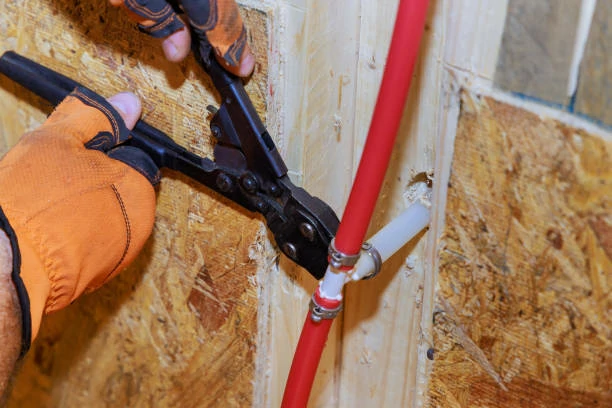PEX (cross-linked polyethylene) pipes have become a popular choice for plumbing systems due to their flexibility, durability, and resistance to corrosion. Understanding the lifespan of PEX pipes is essential for homeowners and professionals to ensure proper maintenance and long-term reliability. This guide explores the factors affecting the lifespan of PEX pipes and provides insights on what to expect in terms of durability and performance.
Introduction to PEX Pipes
PEX pipes are a modern plumbing solution known for their versatility and ease of installation. They offer several advantages over traditional plumbing materials like copper and PVC.
- Flexibility: PEX pipes can bend and curve, making installation easier in tight spaces.
- Durability: PEX pipes resist corrosion and scale buildup, ensuring long-lasting performance.
- Cost-Effective: PEX pipes are often more affordable than metal alternatives, reducing overall plumbing costs.
Factors Affecting PEX Pipe Lifespan
Several factors influence the lifespan of PEX pipes, including material quality, installation practices, environmental conditions, and maintenance.
- Material Quality: High-quality PEX pipes from reputable manufacturers generally last longer.
- Installation Practices: Proper installation techniques, including secure fittings and correct pressure settings, extend pipe lifespan.
- Environmental Conditions: Exposure to extreme temperatures, UV light, and chemical contaminants can affect PEX pipe durability.
- Maintenance: Regular maintenance and prompt repairs of any issues ensure optimal performance and longevity.
Expected Lifespan of PEX Pipes
PEX pipe typically have a lifespan of 40 to 50 years when installed and maintained properly. Some factors can extend or reduce this expected lifespan.
- Manufacturer’s Warranty: Many PEX pipe manufacturers offer warranties ranging from 20 to 50 years, reflecting confidence in their product’s longevity.
- Usage Patterns: Pipes in residential settings generally experience less wear and tear compared to those in commercial or industrial applications.
Installation Practices for Longevity
Proper installation is crucial for maximizing the lifespan of PEX pipe.
- Secure Connections: Ensure all connections are secure and free of leaks to prevent water damage and pipe degradation.
- Avoiding Kinks: During installation, avoid kinking the pipes, as kinks can weaken the material and reduce lifespan.
- Thermal Expansion: Allow for thermal expansion and contraction to prevent stress on the pipes, particularly in hot water systems.
Environmental Considerations
Environmental factors play a significant role in the longevity of PEX pipes.
- Temperature Extremes: PEX pipe perform well in a wide temperature range, but extreme conditions can impact their lifespan. Insulate pipes in cold climates to prevent freezing.
- UV Exposure: Prolonged exposure to UV light can degrade PEX pipe. Use UV-resistant covers for outdoor installations or areas exposed to sunlight.
- Chemical Resistance: PEX pipe resist most chemicals found in household water, but exposure to harsh chemicals or high chlorine levels can reduce their lifespan.
Maintenance Tips for PEX Pipes
Regular maintenance helps ensure the long-term performance of PEX pipe.
- Regular Inspections: Conduct periodic inspections to check for leaks, wear, and potential issues. Address any problems promptly to prevent further damage.
- Pressure Regulation: Maintain appropriate water pressure within the recommended range to prevent stress on the pipes.
- Cleaning: Flush the system periodically to remove sediment and buildup that can affect water quality and pipe performance.
Common Issues and Solutions
Understanding common issues with PEX pipes and their solutions can help extend their lifespan.
- Leaks at Fittings: Leaks often occur at fittings. Ensure proper crimping and secure connections during installation. Regularly inspect and tighten fittings if necessary.
- Freezing: Insulate PEX pipes in cold areas to prevent freezing. Use heat tape in extreme conditions to protect the pipes.
- Chemical Damage: Avoid exposure to harsh chemicals. Use water treatment solutions to maintain water quality and protect the pipes.
Professional Maintenance and Repairs
Engage professional services for complex maintenance and repair tasks to ensure the longevity of PEX pipe.
- Annual Checkups: Schedule annual inspections with a professional plumber to identify and address potential issues early.
- Expert Repairs: For major repairs or modifications, rely on experienced professionals to ensure compliance with industry standards and best practices.
- System Upgrades: Consider upgrading older PEX systems with new technologies and materials to enhance performance and extend lifespan.
Conclusion
PEX pipes offer a durable and reliable solution for modern plumbing systems, with a typical lifespan of 40 to 50 years. Proper installation, regular maintenance, and attention to environmental factors are key to maximizing their longevity. By understanding the factors affecting PEX pipe lifespan and implementing best practices, homeowners and professionals can ensure the long-term performance and reliability of their plumbing systems.
Connect
IFAN is a Chinese manufacturer of plastic pipes, fittings and valves with 30 years of experience. If you are interest in IFAN copper fittings, copper valves, plastic pipes and fittings, please contact us. IFAN offers you a variety of standard pipes to meet your specific needs. Click below to learn more about IFAN’s wide range of affordable and cost-effective valve products and piping system related products.
We will reply your email or fax within 24 hours.
You can call us at any time if there is any question on our production.
For more information,pls visit our webside https://ifanpro.com/
Pls Mailto: [email protected]
Whatsapp: + 86 19857948982














Recent Comments